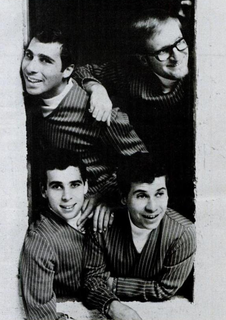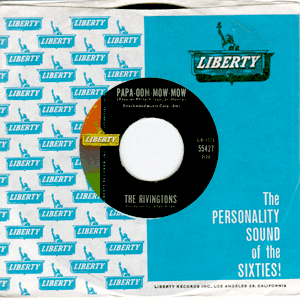The Penguins were an American doo-wop group of the 1950s and early 1960s, best remembered for their only Top 40 hit, "Earth Angel", which was one of the first rhythm and blues hits to cross over to the pop charts. The song peaked at No. 8 on the Billboard Hot 100 chart, but had a three-week run at No. 1 on the R&B chart, later used in the Back to the Future movies. The group's tenor was Cleveland Duncan.

Doo-wop is a genre of rhythm and blues music that originated among African-American youth in the 1940s, mainly in the large cities of the United States, including New York, Philadelphia, Chicago, Baltimore, Newark, Detroit, Washington, DC, and Los Angeles. It features vocal group harmony that carries an engaging melodic line to a simple beat with little or no instrumentation. Lyrics are simple, usually about love, sung by a lead vocal over background vocals, and often featuring, in the bridge, a melodramatically heartfelt recitative addressed to the beloved. Harmonic singing of nonsense syllables is a common characteristic of these songs. Gaining popularity in the 1950s, doo-wop was "artistically and commercially viable" until the early 1960s, but continued to influence performers in other genres.

The Teenagers are an American doo wop group, most noted for being one of rock music's earliest successes, presented to international audiences by DJ Alan Freed. The group, which made its most popular recordings with young Frankie Lymon as lead singer, is also noted for being rock's first all-teenaged act.

"Earth Angel", occasionally referred to as "Earth Angel ", is a song by American doo-wop group the Penguins. Produced by Dootsie Williams, it was released as their debut single in October 1954 on Dootone Records. The Penguins had formed the year prior and recorded the song as a demo in a garage in South Central Los Angeles. The song's origins lie in multiple different sources, among them songs by Jesse Belvin, Patti Page, and the Hollywood Flames. Its authorship was the subject of a bitter legal dispute with Williams in the years following its release.

"Stand and Deliver" is a song by British new wave band Adam and the Ants, released as the lead single from their third studio album, Prince Charming (1981). It was the band's first No. 1 hit in the UK. The phrase "stand and deliver — your money or your life", used in the lyrics, is commonly associated with highwaymen in 18th century England.

The Tokens were an American male doo-wop-style vocal group and record production company group from Brooklyn, New York. They are known best for their chart-topping 1961 single, "The Lion Sleeps Tonight".

"Sh-Boom" is an early doo-wop song by the R&B vocal group The Chords. It was written by James Keyes, Claude Feaster, Carl Feaster, Floyd F. McRae, and William Edwards, members of The Chords, and published in 1954. It was a U.S. top-10 hit that year for both the Chords and The Crew-Cuts.

Maurice Williams and the Zodiacs were an American doo-wop/R&B vocal group in the late 1950s and early 1960s. Originally the (Royal) Charms, the band changed its name to the Gladiolas in 1957 and the Excellos in 1958, before finally settling on the Zodiacs in 1959.
The Cadets were an American doo-wop group, formed in Los Angeles, California, United States. The group began as a gospel group, the Santa Monica Soul Seekers, in the late 1940s. The members were Lloyd McCraw, Willie Davis, Austin "Ted" Taylor, Aaron Collins, Glendon Kingsby, and Will "Dub" Jones. In 1955, the group auditioned for Modern Records, and were accepted. The group decided to switch to the popular R&B style, with the exception of Kingsby, who left to continue in gospel music.

"Doo Wop " is the debut solo single of American recording artist Lauryn Hill. The song is the lead single from her debut album, The Miseducation of Lauryn Hill. It was written and produced by Hill. The song was initially released as a radio-only single in the United States on August 10, 1998, and no commercial single was originally intended for the single; however, limited-quantity physical formats were issued two months later, on October 27, making the song eligible to appear on the US Billboard Hot 100 chart.

"Papa-Oom-Mow-Mow" is a novelty nonsensical doo-wop song by the Rivingtons in 1962. It peaked at number 48 on the Billboard Hot 100, and number 35 on the Cashbox charts. The band released two similar follow-up songs over the next several months, "Mama-Oom-Mow-Mow " and "The Bird's the Word".
The Chords were a American doo-wop group formed in 1951 in The Bronx, New York, known for their 1954 hit "Sh-Boom", which they wrote.
The Jesters were a doo-wop group based in New York City who achieved success in the late 1950s. They were students at Cooper Junior High School in Harlem, who graduated from singing under an elevated train station near 120th Street to the amateur night contest at the Apollo Theater, where Paul Winley discovered them and later signed them to his Winley Records.
"Don't Be Angry" is a popular song written by Nappy Brown, Rose Marie McCoy, and Fred Mendelsohn and published in 1955. Brown released it in 1955, reaching No. 2 on the Billboard R&B charts. It also went to No. 25 on the US Best Seller list.

"Who Put the Bomp " is a doo-wop style novelty song from 1961 co-written and recorded by Barry Mann. It was originally released as a single on the ABC-Paramount label (10237).
Prentice Moreland was an American R&B and doo wop singer of the 1950s and early 1960s.

"Antmusic" is a song by English rock band Adam and the Ants, released as the third single in the UK in 1980 from the album Kings of the Wild Frontier.
"Daddy Cool" is a song by US doo-wop group The Rays and was released on Cameo Records as the B-side of their 1957 single "Silhouettes". It became a #3 hit on the Billboard Pop singles chart. The song was written by Bob Crewe and Frank Slay, who had also written the A-side, "Silhouettes". The song became a #1 single on the Australian singles charts when covered by novelty band Drummond in 1971, and remained there for seven weeks. UK cover band Darts also had a hit single with the song, which reached #6 in 1977.
"Bad Girl" is a 1959 doo-wop single by The Miracles. Issued locally on the Motown Records label, it was licensed to and issued nationally by Chess Records because the fledgling Motown Record Corporation did not, at that time, have national distribution. It was the first single released on the Motown label – all previous singles from the company were released on Motown's Tamla label. Although The Miracles had charted regionally and on the R&B charts with several earlier songs, including "Got a Job", "I Cry", "I Need a Change", and "(You Can) Depend on Me", "Bad Girl" was their first national chart hit, reaching #93 on the Billboard Hot 100. Written by Miracles lead singer Smokey Robinson and Motown Records' President and Founder Berry Gordy, "Bad Girl" is a sad, remorseful ballad about a young woman, whom Robinson, as the narrator, says "was so good at the start", but who later in the song "is breaking my heart". It is in the popular doo-wop style, as several of The Miracles' songs were during the late 1950s. The record's success, coupled with the distributor's failure to pay Gordy and The Miracles properly for its sales, prompted Robinson to urge Gordy to "go national" with it, meaning that Motown should do its own national distribution of its songs, and eliminate the middleman, to ensure that all money from sales of its records would go directly to the label.
Brenda Reid is an American singer, who was lead singer of the group The Exciters best known for single "Tell Him". Brenda was married to fellow band member Herb Rooney.










